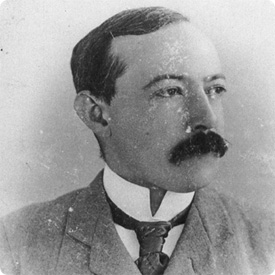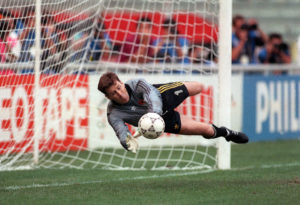12th November 1921, On this date, back in history, Billy Walker became the first player to score a hat-trick of penalties in the League in Aston Villa’s 7-1 home, First Division victory over Bradford City. here are some more facts about the penalty kick.
When the Irish Football League kicked off in September 1890, all its constituent clubs came from Belfast apart from one – Milford Football Club of County Armagh. The club’s goalkeeper was a 25-year-old called William McCrum. He’d come from a fairly wealthy family and been educated at the prestigious Trinity College in Dublin, an establishment that was an early adopter of football in Dublin.
McCrum was involved in the foundation of Milford FC and in 1890, annoyed by the amount of foul play in the game, he pitched an idea to the Irish Football Association (IFA)’s secretary Jack Reid – introduce a penalty kick for fouls close to goal. Reid sat on the International Football Associations’ Board (IFAB), made up of the four ‘Home Nations’ FAs alongside England, Scotland, and Wales, so he had some sway on the Association football rulebook.
The world's first penalty kick was awarded to Airdrieonians in 1891 at Broomfield Park, The first penalty to be taken – and scored – under the new law was converted, fittingly, by an Irishman, James McLuggage (seriously), for Royal Albert against Airdrieonians in a charity match in Scotland, just days after Law 14 was passed. James Connor (22 February 1861 – 29 January 1899) was a Scottish footballer who played for Airdrieonians, Queen's Park, Corinthians and Scotland. He had the distinction of being the goalkeeper to face the first ever pemalty kick in the history of football, awarded in a local cup tie on 6 June 1891, four days after the rule was introduced by the International Association Football Board.
 On the anniversary of soccer’s penalty kick, here is the man who made the radical proposal, Armagh’s William McCrum.
On the anniversary of soccer’s penalty kick, here is the man who made the radical proposal, Armagh’s William McCrum.
Some sporting histories have chronicled that the first penalty scored in a game of soccer was by Alex McColl. The Renton player successfully converted his spot kick away to Leith Athletic in the Scottish League on August 22nd 1891.
However, another fact that has largely went under the radar, is that on January 6th that same year, the first ever penalty kick was awarded in a competitive fixture. That also occurred in Scotland, and the honour fell to Airdrieonians F.C. at their home stadium of Broomfield Park. And so began the life of one of Soccer’s most dramatic rules.
Later that year, the first penalty kick in English Football was awarded to Wolverhampton Wanderers against Accrington Stanley at Molineux Grounds on 14th September, and was scored by John Heath. The penalty rule had only been proposed the previous year – by William McCrum from Milford in County Armagh. The only son of Robert McCrum, a linen merchant, William was a former pupil at The Royal School, Armagh and graduated from Trinity College, Dublin in 1886.
William McCrum was a goalkeeper for Milford F.C., a small club that played in the Irish Championship’s first season in 1890-91. Playing in that position, he had witnessed the effects of breaches of the rules and similar unsporting behaviour on the field. His proposal placed the goalkeeper, a bystander up to that point, at the centre of the action.
Though his idea was initially derided and then followed by heated debates, McCrum was brave enough to submit his proposal for “a penalty kick” to the Irish Football Association. After due consideration, it was officially accepted on 2nd June 1891, almost five months after Airdrieonians had been awarded the inaugural penalty! Twelve months later, it was also approved by the International Football Association Board after the Irish F.A. presented it at the Alexandra Hotel in Glasgow. At that point, the penalty kick was incorporated into the official laws of the game of football.
It is interesting to note that, at the time, McCrum’s new invention wasn’t greeted with universal acclaim; in fact the English FA regarded it as a contradiction in terms. In their view, only gentlemen played soccer and gentlemen didn’t cheat, while sections of the press angrily condemned the “Irishman’s motion” as a “death sentence” for the game.
Although an Irish League founder and one of their key administrators, the young goalkeeper got little or no credit for the new rule. At that stage in the nineteenth century, when soccer was at an embryonic stage, who could have foretold just how important the penalty kick would become. It has gone on to decide the outcome of some of the world’s greatest football tournaments, including World Cup Finals.
For the first ten years of its life, the penalty kick was taken from a spot anywhere along a 12 yard line. Then in 1902, the International Football Board introduced the penalty area, 18 yards from the goal line and 44 yards wide with a penalty spot at its centre.
As for the dreaded ‘penalty shootouts’ that are now so prevalent in the sport, these were not immediately introduced. Knock-out games were decided through a replay or simply tossing a coin after the extra time had elapsed.
On the occasion where a replay was not possible, ties were decided by the drawing of lots. One famous example of this method was during the 1968 Olympics, when Israeli player Yosef Dagan watched his national team lose at the quarter final stage. The anguish of this defeat led to his proposal of the modern penalty shootout.
Dagan is credited for the origin of the penalty shootout, but this has been disputed by some reports which claim that a German referee, Karl Wald, had a similar proposal presented to the Bavarian F.A. in 1970. The proposal adopting a penalty shootout was adopted by UEFA in 1970; FIFA followed suit six years later, and the method has been used ever since at all levels of Football around the world. The first major international competition to use penalty shootouts was the 1976 European Championships tournament, and it was a magnificent penalty by Antonin Panenka that earned Czechoslovakia a win against favourites West Germany in the final.

From an Irish perspective, who could ever forget the famous penalty save by Packie Bonner from Daniel Timofte’s kick in the 1990 World Cup in Italy – and then the successful penalty by David O’Leary to send Ireland into the Quarter Finals of that tournament!
The world’s first penalty kick was awarded to Royal Albert FC in their Airdrie Charity Cup game at Airdrieonians in 1891 just four days after the IFAB rule change was ratified and announced. The honour to make history fell to James McLuggage who scored from the 12-yard line. The first penalty awarded and scored in England came in September when “Billy’ Heath scored for Wolverhampton Wanderers in their league match against Accrington Stanley.
The rules as we know them today came into play from 1902 with the creation of the 18-yard box and whilst there has been changes to almost every one of the original rules, the basics have remained the same for over 115 years – an offence committed anywhere in the 18-yard box results in a penalty kick from 12-yards out, with the goal keeper not allowed to move fully off his line before the ball is struck.
Reid encountered resistance when he put what became known as the ‘Irishman’s motion’ to IFAB, especially from the English public-school-educated administrators who did not believe that gentlemen would cheat at sport. However, a controversial incident in the FA Cup quarter final between Notts County and Stoke City at Trent Bridge soon bought the ‘Irishman’s motion’ back on the table at IFAB.
County were leading 1-0 in the final minute of the tie, when one of its defenders deliberately handled a goal-bound shot from Stoke to prevent an equalizer. The existing laws only permitted Stoke an indirect freekick, so Notts County’s players simply created a human wall on the goal line to block the shot. Stoke City went out, while County went on to reach the final at the Oval in London, losing to Blackburn Rovers.
- It was awarded for an offence committed within 12 yards of a goal-line, with a horizontal line being marked on the pitch (the penalty area not introduced until 1902).
- It could be taken from any point along the new line 12 yards from the goal-line.
- It was awarded only after an appeal made by the attacking team to the referee in a similar way to how the fielding/bowling team in cricket make a appeal for a wicket.
- There was no restriction on dribbling with the ball in a similar way to the old US-style shoot-out.
- The ball could be kicked in any direction including backwards.
- The goal-keeper was allowed to advance up to 6 yards from the goal-line – one of the reasons for the creation of the 6-yard box.
and the first penalty kick in the Football League was awarded to Wolverhampton Wanderers in their match against Accrington at Molineux Stadium on 14 September 1891.
In the Scottish League, ‘village club’ Renton were awarded the first penalty in competitive football on 22 August 1891, scoring from the resulting kick away to Leith Athletic. In England, three weeks later, Wolverhampton Wanderers bagged the first penalty awarded in senior football south of the border.
Before we consider the ramifications of any change(s), let’s go back 130 years when the idea of a penalty kick, credited to goalkeeper and businessman William McCrum, was presented by the Irish Football Association to the International Football Association Board (IFAB) 1890 Meeting. After a year of debate, the rule changes came into play at the start of the 1891/92 season.
However, the rules pertaining to the humble spot kick agreed by IFAB were very different to what we know today. In the typed update issued to all football associations they laid out the new rules for the penalty kick: Brian Deane scored the first penalty in the history of the Premier League, then known as the Premiership. The Sheffield United striker had also scored the first goal in the history of the competition, on the opening day of the inaugural season on Saturday 15 August 1992.
No comments:
Post a Comment